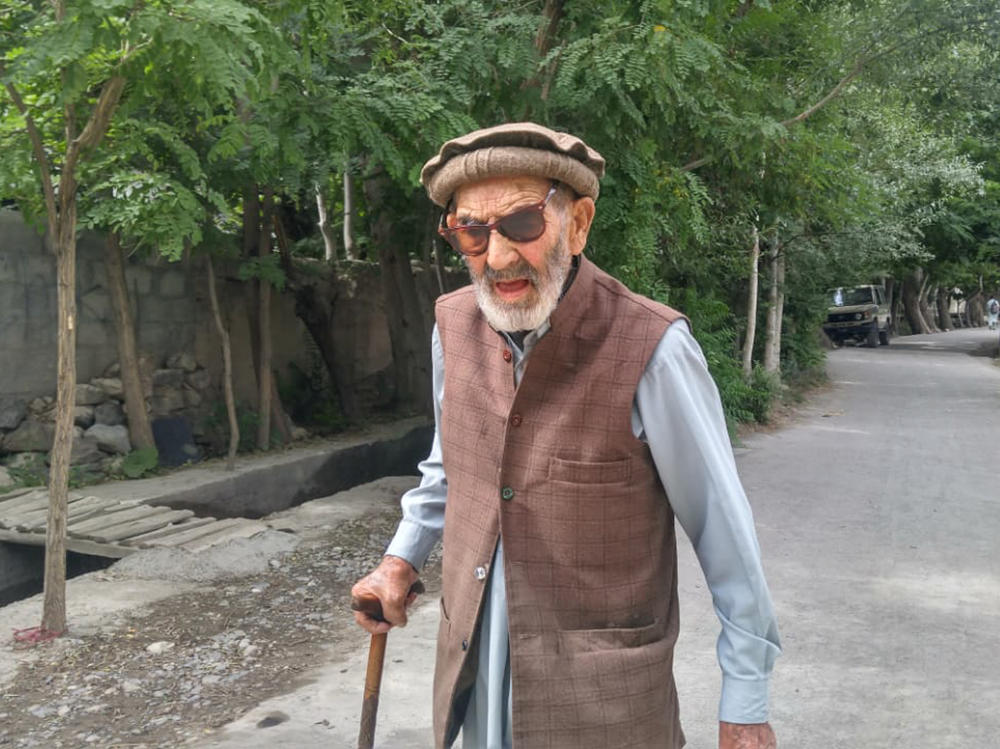Section Branding
Header Content
A 104-year-old COVID survivor has died. He wanted to keep people safe until the end
Primary Content
Abdul Alim, one of Pakistan's oldest COVID survivors, died of natural causes on Jan. 27 at age 104.
Alim made headlines last year when he got vaccinated, encouraging others — especially those in his region of Upper Chitral in northern Pakistan — to do the same. Although vaccine hesitancy is a major issue in his country, Alim was an outspoken proponent of the vaccine.
"If a 100-above-year-old man like me can feel perfectly fine, everyone should have the courage to take it," he told NPR in May 2021. "There is no reason one should not take the vaccine."
A survivor and an advocate
In July 2020, Alim became one of the oldest survivors of coronavirus in the world.
At the time, the news of a potential COVID vaccine filled him with hope. He was afraid of getting sick again, and he wanted to get back into the world. "I wanted to benefit from it as soon as possible," he said. "I was tired of living life in isolation. I wanted to meet people, talk to them."
Alim said he was inspired to get the Sinopharm vaccine in April 2021 after he heard about it from his religious leader. "I am not very educated, so I do not understand much about it, but he told us that he had been vaccinated against COVID-19 and recommended everyone to do the same as soon as the vaccines are offered."
It was a big deal at that time for him to get a COVID shot. A survey of 1,000 people in Pakistan in January 2021 found that 50% didn't want to get the COVID-19 vaccine, fearing potential side effects.
After he got vaccinated, Alim said he was excited to fill up his social calendar and celebrate the Muslim holiday Eid ul-Fitr with his community. "I feel I am unchained now," he said. "I encourage everyone to take the vaccine."
'Pray for his soul from afar'
Alim was due for his booster shot in January but had not been feeling well, says his son Sohail Ahmad. "We waited for him to feel better. We were not sure whether his body was strong enough to sustain even mild side effects."
Alim was sick for five or six days, then passed away. Ahmad says his father discouraged people – especially those from outside his village Booni in Chitral – from visiting. COVID cases in their area were again on the rise.
In most Muslim cultures, it's common practice for friends, family and neighbors to visit loved ones who are sick and dying. In a close-knit community like Chitral, people bring food to the person's house or help with house chores. After a death, visitors console the grieving family to offer their compassion and pray alongside them.
"Although my father did not like to be in isolation, he advised us to urge people not to come visit him," says Ahmad. "He even said that he will be happier if people can pray for his soul from afar instead of coming from faraway villages. My father was concerned for people's health and even in death he wanted to keep people and our family safe."
He 'enjoyed his life to the fullest'
To make sure that people abided by his father's last wishes, Ahmad wrote a message on his Facebook page, telling friends and family to express their sympathies via telephone or social media. "Calls are enough to express your condolences and it will make my father's soul happy, too," he says he told them.
Ahmad says he received more than 500 calls and messages on his phone and Facebook page.
People remembered Alim — who was a carpenter by trade before he retired in 1988 — for being an original thinker and an eloquent speaker. "He saw the world with a diverse perspective," wrote commenter Shams Booni in a Facebook message. He "enjoyed his life to the fullest and didn't give a hoot about how the world thought about him."
Alim is survived by his wife, two daughters, two sons and seven grandchildren.
Benazir Samad is an international multimedia journalist at Voice of America in Washington, D.C. She tweets @benazirmirsamad.
Copyright 2022 NPR. To see more, visit https://www.npr.org.

